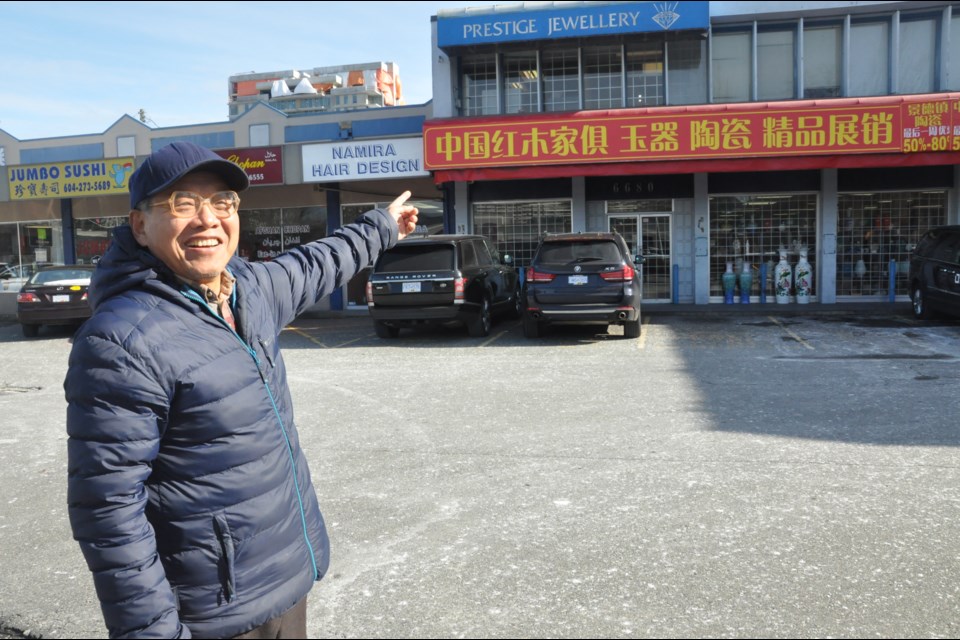A Chinese-speaking business owner, who inadvertently tumbled into an ongoing language debate in Richmond, says city council should implement a bylaw requiring English on signs.
Last week, Hong Guang Zhang erected a Chinese-only business sign at his art and ceramics store on No. 3 Road, in the sightlines of Richmond City Hall.
Regardless of language, the sign was illegal, because he hadn’t acquired a permit, as it was erected prior to obtaining a business licence.
When some residents complained publicly about the sign, City of Richmond officials fined Zhang $400 for having no permit.
Had Zhang acquired the licence before erecting the sign, he would have been informed that a municipal policy encourages half English on all signs requiring permits.
While Zhang told the Richmond News - via a Mandarin-speaking reporter - he acknowledges his permit mishap, adding that a bylaw would make it easier for businesses, such as his, to include 50 per cent English.
“The rules aren’t so clear,” said Zhang, adding it was an oversight that he didn’t include English on his original sign, as he welcomes many non-Chinese customers to his business.
Meanwhile, community activist Kerry Starchuk, who petitioned city hall for an enforceable bylaw in 2013, says Zhang’s mistake is not new.
“The issue will keep arising without a language law in B.C.,” said Starchuk.
But Coun. Ken Johnston said there has been 100 per cent compliance of the policy and this “one off,” while “annoying,” is just that — an exception. “Let’s not overreact,” said Johnston.
Starchuk said there are many more examples of Chinese-only signage.
A past study by the city, of Chinese-only signs, found under five per cent of permitted business signs were truly only Chinese.
However the study didn’t account for signs that are mostly Chinese, nor non-permit Chinese-only signage, such as banners and posters.
In June, city council came close to mandating 50 per cent English on all regulated business signs in Richmond, via an enforceable bylaw, only to change their minds at a subsequent meeting.
Coun. Chak Au said he still favours the softer policy.
“The legal challenge of a bylaw is critical,” said Au.
That legal challenge includes the possibility of the city being challenged under the Charter of Rights.
But according to legal advice obtained by the city, such a bylaw requiring English on signs could be justified if non-English signage is detrimental to the community.
Starchuk maintains foreign language signage (de facto Chinese-only signage) sows discord in the community.
No so, said Johnston.
“I think we have harmony in the community at this point in time, that’s what I believe,” said Johnston.
Many in the Chinese community have supported the concept of a bylaw to maintain English as a common language on business signs.
In the 2014 municipal election campaign, mayoral candidate Richard Lee, a lawyer, and campaign partner Sunny Ho, a developer, supported such a bylaw.
They’ve since formed the Richmond Business Association, made up of mostly Chinese businesses. Support was also found across political spectrums, such as from council candidates Helen Quan, a Conservative, and Henry Yao, a New Democrat.
Last year, city council created a “clutter bylaw,” whereby window signs and sidewalk sandwich boards are limited to varying degrees. The move was seen as a measure to control large signs, often in foreign languages, from overtaking city streetscapes.
The clutter bylaw is in effect across the city but appears to work on a complaint basis. For instance, Steveston Village has numerous shops with sidewalk signage.
Adding to the complexities of the language debate in Richmond is a new City of Richmond requirement to have English on its own bus shelters. The city contends it may regulate its own property but not private businesses, without the threat of a legal challenge.
Meanwhile, controversial bus ads in Chinese have added to the debate.
-With a file from Daisy Xiong/Richmond News



